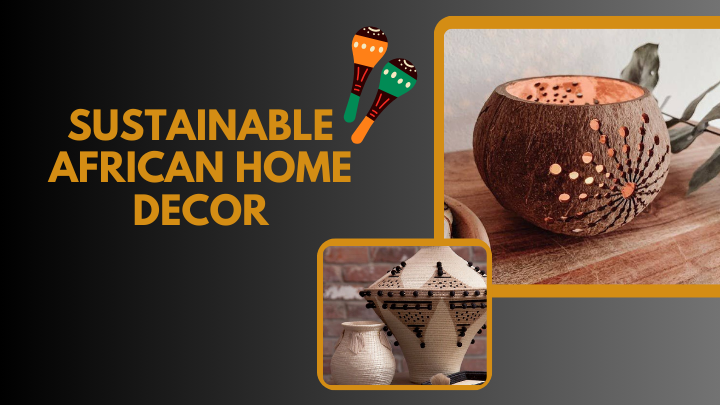Sustainable African Home Decor
As consumers become increasingly aware of the environmental impact of their purchasing decisions, the demand for sustainable home decor options has grown. African crafts, with their deep-rooted traditions of resourcefulness and respect for nature, offer an abundance of eco-friendly home decor solutions. From recycled glassware to reclaimed wood furniture and handcrafted woven items, African artisans have long embraced sustainable practices, creating decor pieces that are not only beautiful but also kind to the planet.
In this article, we’ll explore some of the most popular sustainable African home decor options, highlighting eco-friendly materials and fair-trade practices that allow you to furnish your home with a clear conscience.
1. Recycled Glassware: Beautiful and Eco-Conscious
Glass recycling is an age-old tradition in many African communities, where old glass bottles and jars are transformed into stunning home decor items. This process not only reduces waste but also gives new life to materials that would otherwise end up in landfills. Recycled glassware, including vases, bowls, glasses, and decorative pieces, is a staple in sustainable African home decor.
The Benefits of Recycled Glassware:
- Environmental Impact: Recycling glass reduces the need for raw materials, conserving natural resources like sand, soda ash, and limestone. It also requires less energy than producing new glass, making it a more sustainable choice.
- Unique Designs: Recycled glass items are often handcrafted, which means each piece is unique. The fusion of colors, textures, and patterns creates a one-of-a-kind item that adds character to any room.
- Supporting Local Communities: Many African artisans who create recycled glassware are part of fair-trade cooperatives, ensuring that their work benefits both the artisans and the environment.
How to Incorporate Recycled Glassware:
- Vases: Use recycled glass vases to display fresh flowers or greenery. Their unique textures and colors can complement any room, from minimalist to eclectic.
- Drinkware: Add a rustic touch to your dining table with handcrafted recycled glass glasses or tumblers. They add a sense of history and artistry to your kitchenware.
- Decorative Bowls: A large recycled glass bowl can serve as a statement piece in your living room or as a centerpiece on your dining table.
2. Reclaimed Wood Furniture: A Timeless and Eco-Friendly Choice
Wood is an integral part of many African cultures, and artisans have long been skilled in using reclaimed wood to craft beautiful, functional furniture. By repurposing old wood from buildings, ships, or other sources, artisans create pieces that have both historical and environmental value. Reclaimed wood furniture is not only eco-friendly but also carries a sense of nostalgia and uniqueness.
The Benefits of Reclaimed Wood Furniture:
- Waste Reduction: Reclaiming wood from old structures reduces the demand for new lumber, helping to conserve forests and natural resources.
- Durability and Quality: Reclaimed wood often comes from trees that have had decades or even centuries to grow, resulting in dense, strong wood that is highly durable and long-lasting.
- Unique Aesthetic: Each piece of reclaimed wood has its own story and character, with imperfections that add charm and personality to furniture items. These marks tell the history of the wood, making every piece truly one-of-a-kind.
How to Incorporate Reclaimed Wood Furniture:
- Tables: A large reclaimed wood dining table or coffee table can serve as the centerpiece of your living or dining room. The natural beauty and craftsmanship will make it stand out as a timeless, sustainable choice.
- Shelving and Storage: Create a rustic, eco-friendly storage solution with reclaimed wood bookshelves or cabinets. These pieces not only look beautiful but also provide practical storage for your belongings.
- Accents: Small reclaimed wood items, such as picture frames, trays, or lamp stands, can add subtle eco-friendly elements throughout your home without overwhelming the space.
3. Woven Items: Traditional Crafts with a Sustainable Twist
African weaving traditions have been passed down through generations, and many artisans use sustainable, locally sourced materials to create woven home decor items. From baskets and rugs to placemats and wall hangings, woven goods offer a durable, eco-friendly option for adding texture and warmth to your space.
The Benefits of Woven Items:
- Natural Materials: Woven items are typically made from natural, renewable materials such as grasses, palm fronds, and sisal. These materials are biodegradable and have minimal environmental impact.
- Energy-Efficient Production: Many woven items are made by hand, without the use of energy-intensive machinery. This process not only reduces the carbon footprint but also supports traditional craftsmanship.
- Cultural Significance: Woven goods often carry cultural and historical significance, with patterns and designs that reflect the values and beliefs of the communities that produce them.
How to Incorporate Woven Items:
- Baskets: Woven baskets are a versatile and practical decor piece. Use them for storage, organization, or as decorative accents throughout your home. Whether hung on walls or placed on shelves, they bring both style and sustainability to your space.
- Rugs: Woven rugs made from natural fibers such as sisal, jute, or cotton can add a rustic, earthy feel to your floors. Their durability makes them a long-lasting, sustainable alternative to synthetic rugs.
- Wall Hangings: Woven wall hangings or tapestries can bring texture and warmth to your walls. These items often feature intricate patterns and designs that reflect the artistic traditions of various African cultures.
4. Fair-Trade Crafts: Supporting Ethical and Sustainable Practices
When shopping for African home decor, it’s important to look for fair-trade products that support artisans and their communities. Fair-trade organizations ensure that artisans are paid fairly for their work, that they have access to safe working conditions, and that their products are made using sustainable practices.
The Benefits of Fair-Trade African Crafts:
- Empowering Artisans: Fair-trade practices empower artisans by providing them with a fair wage for their work, enabling them to support their families and communities.
- Promoting Sustainability: Fair-trade organizations often prioritize environmental sustainability, sourcing materials responsibly and ensuring that the production process is environmentally friendly.
- Cultural Preservation: By supporting fair-trade African crafts, you help preserve traditional skills and techniques that have been passed down through generations.
How to Find Fair-Trade African Decor:
- Research Fair-Trade Brands: Many online stores and marketplaces specialize in fair-trade African crafts. Look for certifications or labels that indicate the product has been ethically sourced.
- Visit Local Artisan Markets: Many cities around the world host artisan markets where fair-trade African goods are sold. These markets are a great place to find unique, sustainable home decor while supporting local artisans.
Incorporating sustainable African home decor into your space is a way to not only beautify your home but also contribute to a more sustainable and ethical world. From recycled glassware to reclaimed wood furniture and woven items, there are countless ways to make your home decor both eco-friendly and culturally rich.
By choosing products that are made from sustainable materials, supporting fair-trade artisans, and embracing eco-friendly production processes, you can create a home that reflects your values while celebrating the artistry and craftsmanship of African cultures. Sustainable home decor allows you to live consciously, reduce your environmental impact, and enjoy beautiful, meaningful pieces in your home for years to come.



